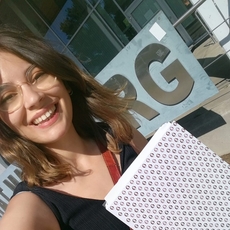Understanding the EU, honorifics, and talking to your teachers

Moving to a different city within a country you are familiar with can still make you feel like you crossed borders. One thing about outsiders is that they bring something with them, new ways to communicate and fresh eyes on what you take for granted.
So, to satisfy my curiosity, I went and spoke to Alba, who is newly teaching the course Introduction to Political Science Research on Europe and beginning her research for her PhD here at OVGU. We start our journey with her first journey - living abroad.
Alba's mom being Spanish, she was curious about the other corner of Europe, which drew her to Lapland - one of the northern provinces of Finland - to study abroad. She liked it so much that she stayed past the first semester, and came back to work and then study for a master's degree. The master's in Finland put together the study of administration, business, and European structures.
Studying, and later at work in the International Office at the University of Lapland, started out with an adventure in intercultural communication. 'Doctor' and 'professor' and other honorifics were a bit unconventional for her teachers and colleagues. Most people won't tell you what to do, you have to figure it out for yourself. What to do? The people around her used first names, frequently thanked each other with concrete examples, and what about small talk? If you're looking for an alternative to this (sometimes odious) custom, chat with Alba and you may start to observe it yourself.
Well, this reception in Finland informed her more recent work in the sociology of work. Basically, this field asks questions about how people relate to each other at work, how the structure of their organization operates, and how change takes place on the institutional level.
We talked a lot about the problems of understanding change in society. It's not an easy subject to grasp even in a class let alone a casual conversation.
Many of these changes are still in progress. For Alba, who follows the news about issues like the abortion law discussion in Ireland and is curious about activists and lawmakers, the EU is a mine to excavate information about how the administration handles issues of gender. She is interested in how networks of people can move changes forward, a kind of impersonal leadership that relies on the group rather than one individual.
Moving to a new place is part of the experience in the program either in coming to Eastern Germany or in studying abroad. Beyond knowledge of European frameworks and theories, teachers also have their personal experience which they pass on if you pay close attention. Normally, you meet them in class once a week, and maybe when they're buying coffee at Dolce & Caffé, take a moment to ask them what they think about something relevant to you and observe what happens - you might be surprised.